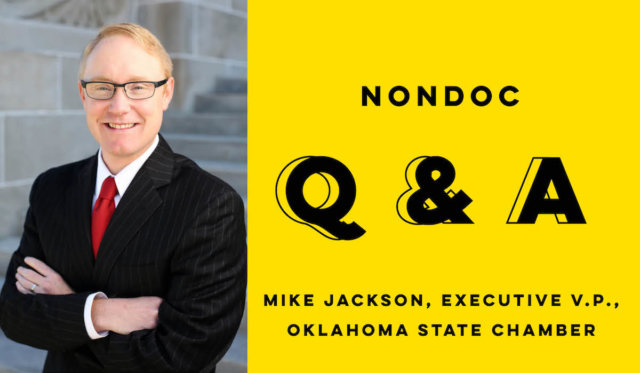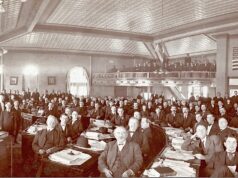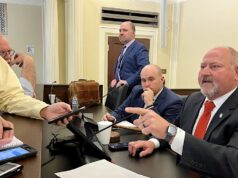In August, the State Chamber of Oklahoma promoted Mike Jackson to executive vice president of vice president of government and political affairs. Jackson represented his hometown of Enid in the House of Representatives from 2005 to 2014.
In the Q&A below, Jackson discusses the chamber’s OK2030 campaign, the desires of state business interests and a reason why the chamber supports accepting federal funding for some sort of expansion of health coverage for lower-income Oklahomans.
Answers have been edited lightly for grammar and style.
Tell us about your new position within the Oklahoma State Chamber? What are the State Chamber’s goals, and how do you personally pursue them?
As executive vice president of government and political affairs, I work with our members and state leaders on policies that help businesses and the state grow. Our mission at the State Chamber of Oklahoma is to strengthen the voice of business at the Capitol and ensure lawmakers understand how their decisions impact the state economy and jobs. I encourage candid conversations that lead to real, workable solutions. It’s important for members of the business community and those who understand business to be engaged in the process. Our Chamber Action Network brings together local chambers of commerce, economic developers and others around shared goals and provides additional resources to improve our state’s business competitiveness.
From 2005 to 2014, you served in the Oklahoma House of Representatives from Enid. What is the biggest difference in the Oklahoma Legislature between 2005 and today? What problems that existed then still remain?
In 2004, Republicans became the majority and had to learn to govern as the majority party. We had major successes on issues we fought for when we were in the minority. Workers’ compensation and tax reform are good examples, and there was consensus on those long-overdue reforms.
There are many challenges facing Oklahoma today including education, health care and infrastructure, but there is less consensus on the solutions. That’s why projects like OK2030 are so important right now.
The political landscape has also been changed by social media. Social media is often used as a tool to inspire fear and polarization, but it can also be a good tool for education. Partisanship is nothing new, but high-profile challenges like the budget deficit, increased turnover of legislators due to term limits, social media and other factors have made it more difficult to build political bridges.
The State Chamber is working on its OK2030 campaign. What are the campaign’s goals, and what can you tell us about OK2030 that hasn’t been widely discussed so far?
OK2030 will be a strategic vision plan for the state of Oklahoma. Despite incredible natural resources and some of the brightest, hardest working people in the country, Oklahoma lands near the middle or the bottom of most national rankings. As a state, we can’t accept that. Our members encouraged us to lead the way toward bold, innovative solutions developed by the business community. Our goal is to strengthen Oklahoma and improve our national rankings by the year 2030.
We’ve conducted extensive interviews with business and community leaders and also received great input from the public through www.OK2030.org. Based on this feedback, we’ll be drafting the framework for the OK2030 strategic plan this fall. The final plan is being released in December, so stay tuned for details! But this project definitely opens up some new possibilities. For example, in the past we’ve played defense on tax reform. But the issue has come up repeatedly in our OK2030 interviews, and it is something we’re ready to engage with and facilitate conversation around.
Critics of the State Chamber might argue that your organization has represented the financial interests of big business to the detriment of Oklahoma’s state budget. When faced with that narrative, how do you reply?
The State Chamber is proud to represent businesses and nonprofits of all sizes and types across Oklahoma. Roughly 75 percent of State Chamber members are small businesses. We know that launching and growing any business is tough. We work to remove barriers and create a climate where Oklahoma businesses can continue growing our economy.
Businesses have a vested interest in the strength of the communities where their employees and customers live and work. Quality infrastructure, an effective education system and a financially healthy state are valued by businesses and are integral to their long-term success.
The State Chamber helps ensure that businesses — small and large — can keep their doors open, provide jobs for Oklahoma families and continue making substantial contributions to our state’s revenue as well as the state and local economies.
Despite efforts of Oklahoma’s hospitals, certain provider groups and several local chambers of commerce, the state has not found a way to accept federal Medicaid dollars for the expansion of health care coverage for the poor. What is the State Chamber’s position on that matter, and with “repeal and replace” apparently stalled, do you believe Oklahoma leaders will re-engage on talks of creating a hybrid Medicaid expansion plan?
The State Chamber has been in favor of accepting federal health care funds. Hospitals must serve everyone who walks through their doors, regardless of their ability to pay. While we wouldn’t have it any other way, the unintended result is that those costs get shifted to businesses. We understand there was hesitation this past session to tackle this issue due to the uncertainty around Repeal and Replace, but it is our hope that state leaders will reexamine this as part of a larger plan to fix our structural problems in Oklahoma.
Education is an important issue and big challenge in Oklahoma right now. What would you like to see happen in the next 12 months for the state’s education system?
Education is definitely a challenge, and one we hear about often in our OK2030 interviews with business and community leaders. We have an obligation to prepare students for the future, teaching them the skills and knowledge they will need to be successful in a global economy. We have to invest in teachers and students, and to do that, comprehensive reforms are needed. In addition, we need to work toward continued expansion for individual career academic plans (ICAP) for students in middle and high school to help them identify and prepare for a career path. We need better use of data to make decisions based on what is proven to be good for students, not just what we think is good for them.
You’ve been known to sing a bit of karaoke. If you could sing one message to the Legislature’s Republican caucuses, what song would you choose? Likewise, if you could sing one message to the Democrats, what song would that be?
I’d send them both the same song: Never Been to Spain. Those who know me won’t be surprised — it’s my “go-to” karaoke song. Who doesn’t love singing, “Well, I’ve never been to heaven, but I’ve been to Oklahoma!”
(Editor’s note: The State Chamber of Oklahoma is currently advertising its OK2030 efforts on NonDoc, but this piece is unrelated to that advertisement.)






















